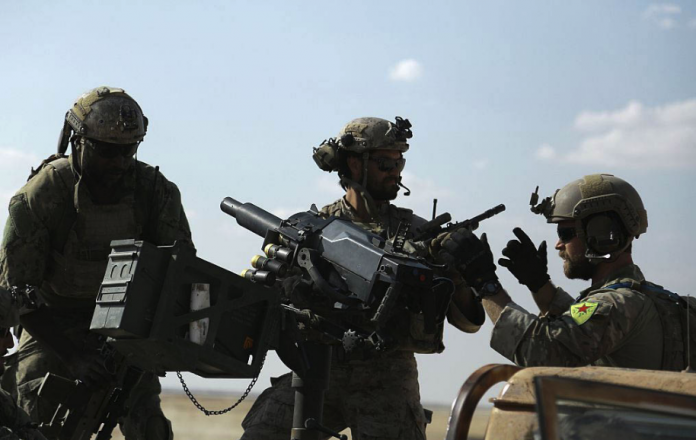
Turkish officials are so furious that American special forces troops accompanying Kurdish militants in Syria are wearing their partners’ insignia on their uniforms that Ankara’s top diplomat suggested Friday that U.S. soldiers add Islamic State flags to their sleeves next.
Speaking at a press conference in Antalya, Turkish Foreign Minister Mevlüt Cavusoglu said that “wearing an insignia of a terrorist organization by U.S. soldiers, who are our ally and are assertive about fighting against terrorism, is unacceptable.”
“Our suggestion to them is that they should also wear Daesh, al-Nusra and al-Qaida insignias during their operations in other regions of Syria,” Cavusoglu said, using an alternative name for the Islamic State. “They can also wear the Boko Haram insignia when they go to Africa.”
Turkey believes the U.S.-backed Kurdish People’s Protection Unit, or the YPG, is an armed wing of the Kurdistan Workers’ Party, or PKK, which both Ankara and Washington have labeled as a terrorist organization. But the United States supports the YPG, claiming it is Washington’s best chance of beating back Islamic State militants in Syria. The photos that emerged Thursday show U.S. commandos on patrol in the village of Fatisah, near the Islamic State’s stronghold in Raqqa, wearing YPG insignia on their sleeves. Cavusoglu said Friday that the YPG is responsible for two recently bombings in Ankara that left dozens dead.
After the photos were released, Maj. Tiffany Bowens, spokesperson for U.S. Special Forces Command in the Middle East, told Foreign Policy in an email that “this practice is officially against uniform regulations,” but “U.S. Special Operations Forces and their counterparts typically swap unit patches as a method to build trust.” The patch swap is intended to signal cooperation, and has been “employed in Afghanistan, Iraq, and Jordan,” she said. “This is a tactical decision and not a reflection of U.S. government policy.”
She would not specifically elaborate on what the American forces are doing on the ground.

